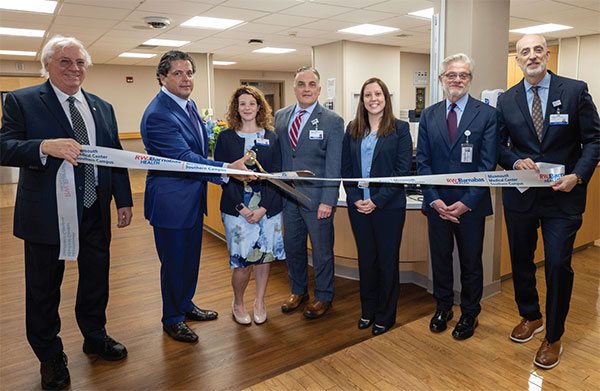
A new model of compassionate care recognizes how past events can affect health and behavior.
How do you respond to a person whose behavior you find difficult or troubling? That question lies at the heart of behavioral health training being implemented at RWJBarnabas Health (RWJBH).
The training educates staff about an approach to patients called trauma-informed care. Its goal is to enhance understanding, compassion, empathy and relationships with patients, especially those who have experienced trauma and often are affected by mental health conditions.
“Trauma-informed care is a shift in the paradigm of how we treat patients and collaborate with them,” says Nicole Powasnick, MSN, RN, NEA-BC, CEN, Chief Nursing Officer at the RWJBH Behavioral Health Center in Toms River, who is leading the initiative systemwide. “It’s about relationships and showing patients that we are in this together.”
The new approach promises not only to help patients get the medical and behavioral health services they need but also to help staff manage stress, fatigue and emotional fallout that can arise from providing care.
Flipping the Script
Trauma-informed care flips a number of approaches often found in traditional models of care. “The traditional approach is to say that health care providers are the authorities and we know best,” Powasnick says. “But that approach doesn’t meet people where they are and often doesn’t work with people who have been traumatized.”
Trauma is important because it is common among patients and can affect both health and behavior. “It could be due to one event, a series of events or a set of circumstances that are threatening or harmful,” Powasnick says. “Trauma can have lasting effects on a person’s physical, emotional or spiritual health and their ability to function.”
Sources of trauma range widely and can include sexual abuse, natural disasters, violence and childhood neglect. “But people experience and respond to trauma differently,” she says.
Those affected by trauma often find it hard to form healthy relationships and may behave in ways that have helped them cope in the past but can distress others. “They often have more difficult health outcomes than people who don’t have trauma,” Powasnick says.
When health care becomes trauma-informed, providers realize the widespread impact of trauma and understand potential paths for recovery; recognize signs and symptoms of trauma; and integrate this knowledge into policies, procedures and practices that also avoid re-traumatizing people.
Trauma-informed care differs from traditional approaches by:
- Prioritizing collaboration instead of control
- Viewing negative behavior as existing for a reason that needs to be figured out rather than simply needing to be stopped
- Placing priority on building emotion-regulating skills instead of getting rid of negative behavior
- Seeing relationships—not rewards and punishment—as the primary agent of change
- Acting as collaborators, not as authorities or experts
- Expecting to be affected by emotions that need to be talked about and managed, not striving to be invulnerable or considering emotions to be unprofessional or weak
Practicing trauma-informed care can de-escalate tense interactions and help providers realize that they don’t need to take patient behavior personally. “Once you recognize that someone acts this way because of something in their past, you can respond in a different way that builds relationships and lets the patient know that you are not the enemy but are here to help them,” Powasnick says.
Critical Training
The new initiative is a significant advance for RWJBH Behavioral Health Services, which, together with Rutgers University Behavioral Health Care, is a leading provider of integrated mental health and substance abuse treatment services, serving over a half-million people each year.
RWJBH training for trauma-informed care launched at the Behavioral Health Center and is now being implemented for behavioral health services at Trinitas Regional Medical Center in Elizabeth and Jersey City Medical Center. Training is also planned for Monmouth Medical Center in Long Branch and Clara Maass Medical Center in Belleville, with additional sites and service lines to follow.
Staff who have undergone training for trauma-informed care readily see how it helps both patients and providers.
“Typical feedback I get after training is, ‘Wow, this opens my eyes and makes a lot of sense,’” says Jaime Basile, LCSW, therapist for the Stepping Stones outpatient program at the Behavioral Health Center. “The new approach is less ‘What’s wrong with you?’ and more ‘What happened to you?’ It helps to understand that someone behaves the way they do because it’s what they know, and they’re doing the best they can.”
Basile also sees how the approach reduces vicarious trauma in staff. “It helps prevent me from feeling burned out,” says Basile, who values monthly self-care sessions in which staff can talk about their own issues.
“Trauma-informed care may be the most important training we’ve ever provided,” Powasnick says. “Once you learn it, you can’t turn it off.”

Among those gathered at a March 4 ribbon-cutting ceremony for the new Medical/Behavioral Specialty Unit at Monmouth Medical Center Southern Campus (MMCSC) were (from left) Raymond Coles, Mayor, Lakewood; Mark E. Manigan, President and Chief Executive Officer, RWJBarnabas Health (RWJBH); Nicole Powasnick, Chief Nursing Officer, RWJBH Behavioral Health Center; Philip Passes, DO, Chief Administrative Officer, Monmouth Medical Center (MMC)/MMCSC; Mabel Laforgia, Chief Nursing Officer, MMCSC; Frank Ghinassi, PhD, Senior Vice President, Behavioral Health Services, RWJBH, and President and CEO, Rutgers University Behavioral Health Care; and Eric Carney, President and CEO, MMC/MMCSC.
A New Unit for Medical/Behavioral Care
In March, Monmouth Medical Center Southern Campus (MMCSC) announced the opening of a new Medical/Behavioral Specialty Unit dedicated to the comprehensive care of patients with behavioral health needs. The unit provides safe care for hospitalized adults who have both medical and psychiatric illnesses.
Located in a secure, limited-access area of the hospital, the eight-bed unit is staffed by a dedicated team of nurses, clinical care technicians and mental health associates who are trained in both medical/surgical and behavioral health care.
Mental illnesses are among the most common health conditions in the United States, and underlying medical conditions such as heart disease or diabetes that require specialized care often go untreated due to behavioral health issues.
“We are very excited about this opportunity to deliver exceptional care to those who need it the most in our community and throughout the RWJBarnabas Health system,” says Philip Passes, DO, Monmouth Medical Center/MMCSC Chief Administrative Officer.
Learn more about Behavioral Health services at RWJBarnabas Health.
 View full issues of Healthy Together magazine by New Jersey region:
View full issues of Healthy Together magazine by New Jersey region: